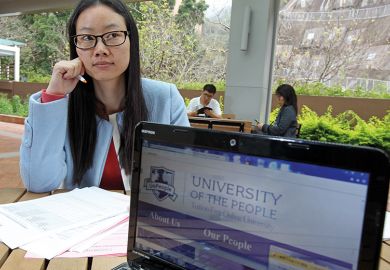The coronavirus will push universities around the world to embrace lifelong education in a dramatic “market shift” as they seek a way out of an “existential crisis”, according to two leading experts on longevity.
Lynda Gratton and Andrew Scott, professors at London Business School, well-established scholars on the social and economic impact of longevity, have just published The New Long Life: A Framework for Flourishing in a Changing World (Bloomsbury), where a chapter on education flags up a number of key developments.
Even before the pandemic, argued Professor Gratton, a professor of management practice, “the traditional three-stage life model – full-time education, full-time work, full-time retirement – was breaking down. People were wanting to go back and learn more, particularly since our jobs are being automated. Providing modules with credentials people can take into the labour market is absolutely crucial.”
Unfortunately, added Professor Scott, a professor of economics, universities had been slow to take this agenda fully on board and remained “some of the most age-segregated institutions” in society. Furthermore, their business model had put them “in the very first line of impact [of the Covid-19 crisis]", he said.
"Normally when the economy goes down, it’s the financial sector that initially gets hit and eventually there’s a quite small problem for universities," Professor Scott continued. But the pandemic crisis “is enormous for [universities], given their dependence on the international student marketplace”.
He added that universities “are going to be making cutbacks but also looking at other sources of revenue...We have a very large need for adult education. Put those two together, and some schools and colleges are going to go for that marketplace, because, at least in terms of numbers of people, it’s 10 times larger than the 18-21 market we tend to focus on.”
Already in 2018, Harvard University had seen the huge potential of the new demographic, with its “Extension School admitt[ing] more students than the rest of Harvard put together”, the two professors write in their book. We were also witnessing a “blurring of the distinction between students and alumni”: Stanford University, for example, had created a Distinguished Careers Institute, where a one-year programme is aimed at “people in midlife with major career accomplishments”, giving them an “opportunity to renew their purpose, develop new communities and recalibrate wellness, and to transform themselves for new roles with social impact”, they write.
At the same time, Dublin City University – part of the Age-Friendly Universities Global Network – runs an Advanced Transitions Programme, for those in “the third age” who are seeking “the tools, resources, learning and time for reflection necessary to make this next life phase [their] best yet”, they note.
More generally, Professor Scott told Times Higher Education, there was likely to be “a market shift towards short-term, flexible distance learning, perhaps in modules. The adult market will see more of that than the traditional 18-21 market”.
So should the coronavirus be seen as an opportunity or a threat?
The current crisis, noted Professor Gratton, meant that “probably all faculties now understand how to use online education at a very sophisticated level. That’s been enormously helpful. It’s done something that IT departments in universities have been trying to do for years.”
This, in turn, opened up space for “a much more sophisticated discussion about how people learn online and how they learn face to face and how we maximise both these opportunities”, she added.
As a result, claimed Professor Scott, vice-chancellors (although perhaps not individual academics) “will be saying to themselves: we’ve got the technology, how can we use that to get revenue – and what other markets can we tap into?”
This was likely to lead to “greater and more differentiation in what is provided by universities”, he continued. “Some will say: we’re just going online. It’s cheap, we can do a good job online and can charge a lower price, get thousands of students and lose all our real estate.”
Yet for “the top-tier institutions”, Professor Scott continued, where online education was likely to remain complementary to campus-based learning, “this just adds to their cost base, because you still have to invest in face-to-face teaching, student support for careers, research, sports facilities and so on – and now high-class digital as well”.
Furthermore, Professor Scott believed that “Covid raises existential questions for universities about what they get involved in and what they don’t”. Although there was “scope for them to do more adult education and short-term learning, to extend degrees to be more intergenerational and to think about modular courses”, they might also be wary of diluting their brand.
One option was partnerships with further education or community colleges, and perhaps private sector providers, “where the university sets a curriculum and there’s a diploma taught through a range of smaller colleges”, Professor Scott suggested.
POSTSCRIPT:
Print headline: Crisis ‘will drive universities into lifelong education’
Register to continue
Why register?
- Registration is free and only takes a moment
- Once registered, you can read 3 articles a month
- Sign up for our newsletter
Subscribe
Or subscribe for unlimited access to:
- Unlimited access to news, views, insights & reviews
- Digital editions
- Digital access to THE’s university and college rankings analysis
Already registered or a current subscriber?








